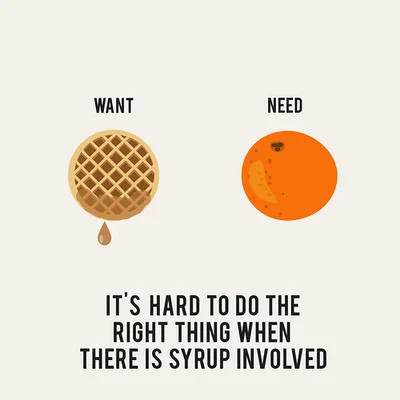Food = Fuel
Nutrition. Such a wide-ranging subject.
In fact, in looking at the topic of nutrition, it would be far too difficult to do it justice in just one write-up. There are so many great sources to cite and possibly hundreds of related angles to present and debate. A daunting task for one man and one article.
So instead, let's focus on just one aspect of things: thinking of food as fuel.
Fuel for your workouts, yes, but also fuel for your day.
The human body is like a well-oiled machine, my friends. You are a high performance sports car. A .372 HP twin turbo engine with automatic transmission and overdrive, including an integrated navigation system, front, rear and side airbags, automatic air conditioning, and cruise control.
But here's the funny part: you are extraordinarily fuel-efficient.
We have nutrition challenges here at Amplify each year to help members figure out their own bodies... what works and what doesn't, what can be cut out and what should be added, what vices exist, etc. In fact we just ended a sugar detox challenge for those who were interested, and despite it being very difficult (particularly at the start), lots of positive feedback has come in as a result.
"I just feel better," seems to be a common phrase.
And what a great point that is. See, it cuts to the chase... no fluff, no BS. Tells it like it is. Eat well to feel well.
It seems that growing up, if a person's family doesn't teach the basic concepts of eating the good food before the treats-- the desserts, the truly "good" tasting stuff-- then the ingrained bad habits are extremely difficult to overcome. Seems obvious, right? Years of unhealthy eating catches up quick. Especially with sugar overdose, the brain locks in to a mindset at the neural pathway level that looks very similar to drug and alcohol addiction. This is what many reports have been showing, and the very issue that the new movie Fed Up examines.
But even if treats are secondary, even if in our development we are taught to suffer through the bland, healthy food on our plates before getting to dessert, there is still a message that gets sent. A subtle, little subliminal mistake morsel.
If we always see food as a reward, it will remain as such.
It's not on purpose. No, parents obviously mean well with this standard set at the dinner table. I, myself do the same thing with my own kids. It's not an easy road, and we all know that.
So what was the mistake again?
It's the thought process. Treating food as a reward.
Animal instinct is to eat for function. Human reality is to eat for fun.
Maybe it's not fair to call it mistake, however. Perhaps that's a harsh claim. Because eating a meal itself should in fact be enjoyable. That's why real food usually wins the battle against supplements; nutritional sources often list the actions of chewing and swallowing as important parts of the eating process... for both the body and the mind. [1] [2]
Also worth mention is enjoying the more modern, wholistically healthy act of socializing with family or friends. Supporters of the eat real food mantra want us to realize that fueling up and replenishing our bodies by actually eating breakfast, lunch, dinner, and other mini-meals is integral to digestive health. It's a fun and fundamental part of the human experience.
We're not just animals, after all. We are intelligent animals. Purportedly.
So what if we combine the two notions from above: we should eat for function and for fun?
Now the food = fuel equation completes itself. It matches our wants and our needs. We need good food to thrive in our daily lives, and we also want it to taste good. Not unreasonable at all.
This isn't an "I'm bored, what's in the fridge?" concept, obviously. And it isn't an "I've been good all week, I deserve an entire pizza!" rationalization either.
It involves the belief that food can taste good and can actually be good for us at the same time. Especially "good" if we look at the function it serves.
Fuel for our day.
Our brain runs on carbohydrates. Our muscles do the same, and replenish with protein. Our body systems use fats in so many ways... it's unfortunate they get such a bad rap. [1] These are our calorie providing macronutrients, and with help from vitamins, minerals, and the almighty water, our day to day tasks can be completed. We live long and we live healthy.
More specifically, as it applies here, food is the fuel for our work and our recovery.
Are you about to hit a strength workout? Are you going into a rough MetCon? Will the work be short and uber-intense, or will it be long and arduous? And if the physical work is done for the day, what will the post-workout meal plan be?
All essential questions when looking at food as fuel throughout the hours of your day.
So where do we search for literature on such an idea?
There are so many resources out there that it may be difficult to sift through the web to find the experts, the authors, and the organizations that really care. Those who are in it for more than just a financial gain. Information ranges from a strict paleo diet plan to a general look at macronutrient ratios, from a more specific focus on the addictive nature of sugar to the benefits of just flat out eating real food.
Even for those who aren't complete newbies to the concept of looking at food as fuel, finding solid resources can be difficult. Please share in the comments if you have your favorites.
As a start, here are a few sources that may be worth your time:
Whole9 Nutritionhttp://whole9life.com
Mark Sissonhttp://www.marksdailyapple.com
Robb Wolfhttp://robbwolf.com
Paleo Table http://paleotable.com
Once we start to see food as a fuel for our body system we can find worth in healthy eating while still enjoying food. And while still having treats as our "cheats," for that matter, if we so choose. With regards to pros and cons of being strict with your healthy diet, find out what works for you. Get to know your body and your habits. And, finally, enjoy yourself. See below.
Recommendations & Questions: 1.) Find out what works
- Toy with things a bit and test out your personal responses to certain foods, specifically before and after working out.
- Do you need more calories going into a workout? Do you function better with a certain type of meal or pre-workout snack? And what about afterwards... what post-workout replenishment leaves you feeling the best by the end of the day or the next morning?
- Record and remember what gave the best results. Seek potential help from a coach or a licensed dietician.
2.) Know your body and your habits
- Decide what will produce the most optimal results.
- Do you need a regimented dietary plan? For instance, will writing down a food log benefit you? Are you the type that needs a strict plan of serving sizes, nutrient break down, etc.? Or will you be good enough with eyeballing foods and portion sizes?
- Don't forget sleep and its function as it relates to recovery. Combine good eating habits with good sleep habits for best results.
3.) Enjoy yourself
- My final addition to the nutrition discussion is to allow yourself to enjoy life with food. More specifically, to allow a cheat here or there.
- Will allowing a cheat meal spiral out of control? See number two above. Have an off meal or maybe an off day? Don't throw out the entire day or week because of it-- you wouldn't take your car to the impound because of a flat tire. Just had that second or third alcoholic beverage? Enjoy it. Don't beat yourself up over it.
- If you feel off track, slap yourself on the wrist and get back to your healthy habits. But for crying out loud, you're only human. Don't stress any more than needed. Eat, live life, and see the big picture.
For now, there's a look at the concept of using food as fuel. So fill 'er up with some high octane nutrients and get after it.
Your mileage may vary.
- Scott, 7.1.2014




